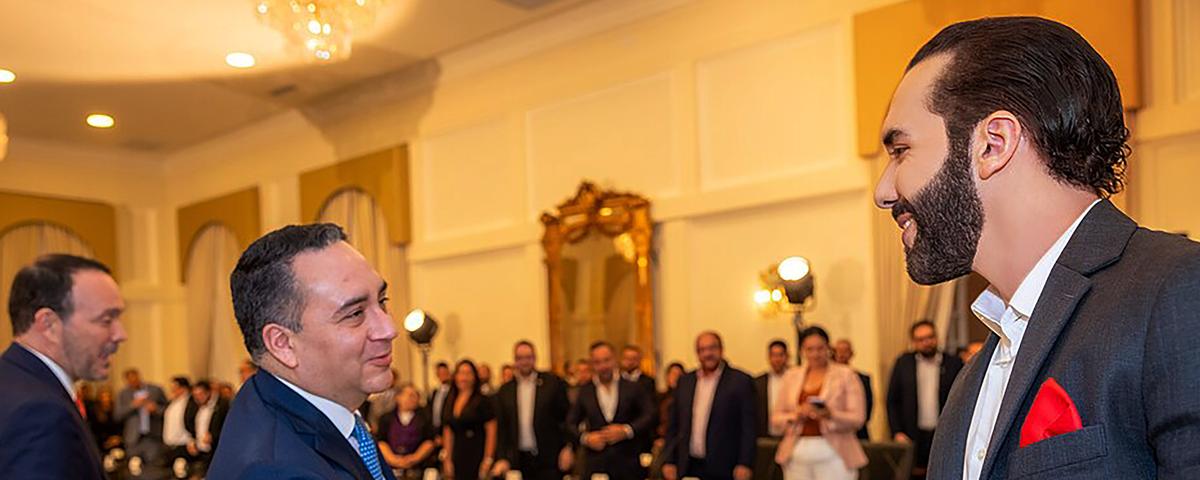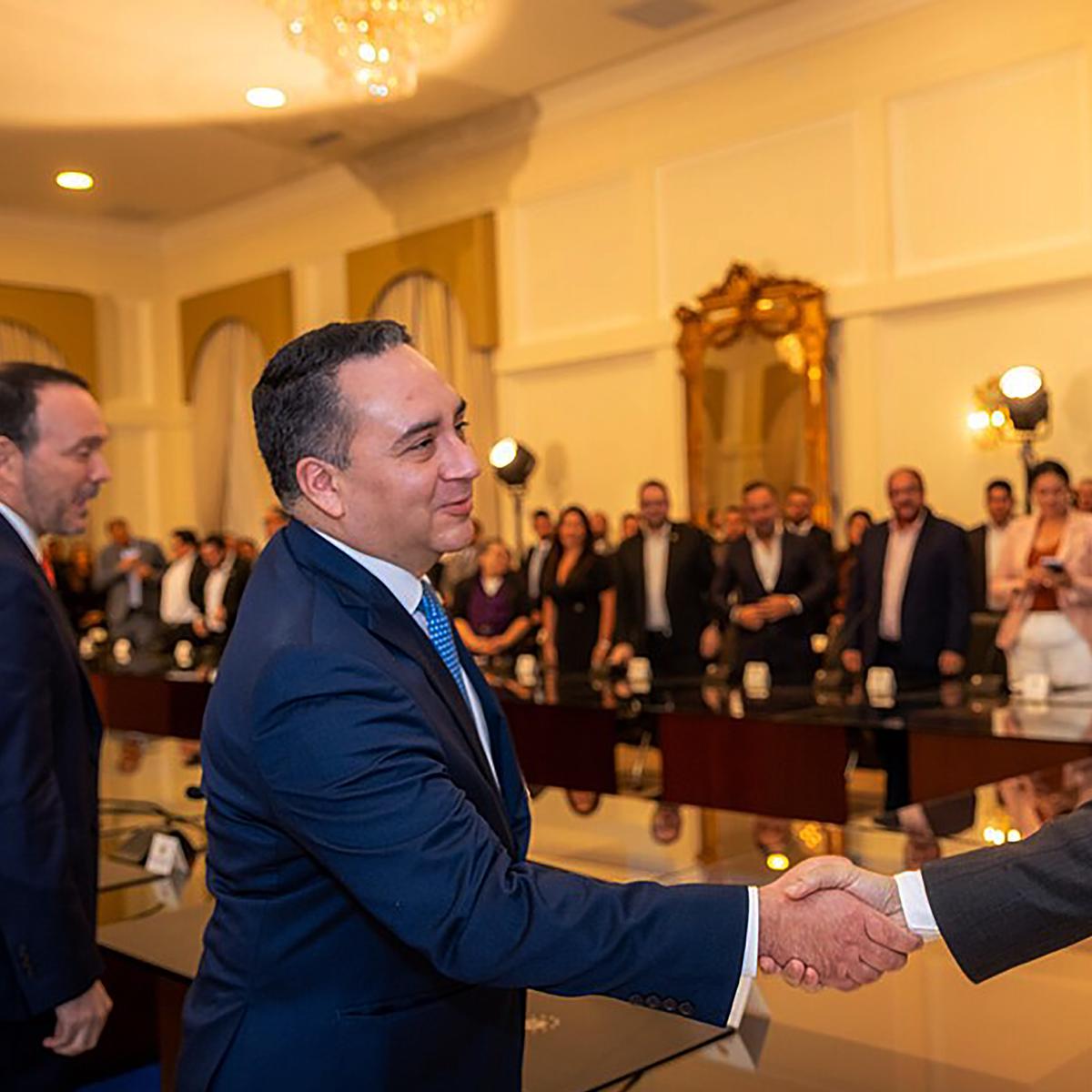There was once a group of prosecutors in El Salvador who took their job seriously. The Special Anti-Mafia Group (GEA), a unit created during the administration of Raúl Melara (2019-2021), uncovered a huge corruption scandal in the Bukele government involving pandemic relief programs. They called the case Cathedral, and one of the prosecutors described it as “the biggest corruption case the Attorney General’s Office has ever investigated.”
They were unable to make much progress. The National Civil Police, under President Nayib Bukele’s control, tried to prevent investigators from entering government offices and suspended cooperation with the Attorney General’s Office. The GEA prosecutors were unable to bring their findings to court because, shortly afterwards Bukele installed his own attorney general, the unit was dismantled and the prosecutors had to leave the country. But their investigations, and the reactions they provoked, exposed the workings of Bukele’s corruption machine, probably the largest structure for the looting of public funds in El Salvador’s modern history.
Bukele’s corruption machine has three gears: the criminal structure, the closure of information, and the takeover and control of all institutions responsible for investigating and combating corruption.
The prosecutors identified the criminal network headed by the Bukele brothers, followed by other relatives of the president, some of his closest collaborators, and members of his cabinet of Venezuelans without official positions who carry out his orders.
The GEA established that this network diverted public funds, decided on the awarding of contracts in secret and by hand, directed purchases of food and medicine to deal with the COVID emergency, and obstructed the institutions responsible for investigating corruption.
A Mafia Regime in El Salvador
The use of the police to prevent these investigations was the first evidence of presidential protection for officials suspected of corruption. Next, the Institute for Access to Information was hamstrung in order to grant almost no requests for information. The Legislative Assembly, controlled by the ruling party Nuevas Ideas, approved a law allowing the government to make discretionary use of $1.5 billion for mega-projects, without controls and in secret.
To avoid accountability, the regime created a host of slush funds: the Directorate of Municipal Works (DOM), the Bitcoin-Chivo funds, the Fund for Civil Protection, Prevention, and Mitigation of Disasters, the Trust Fund for the Economic Recovery of Salvadoran Companies (Firempresa)... Similar to the pandemic emergency decree, they declared a permanent state of emergency that allows discretion in the awarding of contracts and public procurement.
The third cog is institutional capture. Bukele took over the Attorney General’s Office and the Supreme Court, while the new attorney general, Rodolfo Delgado, shelved investigations and threatened journalists who published sensitive information. The president expelled the OAS-backed International Commission Against Impunity in El Salvador (CICIES) and the Supreme Court declared the financial disclosures of public officials confidential. All public information was restricted almost immediately.
Even more brazenly, the Bukele-controlled Assembly passed the infamous “Alabí Law”, nicknamed after the minister of health, Francisco Alabí, which prohibits investigating and punishing officials for purchases made during the pandemic. Between March and August 2020, the Bukele government had an extra $3 billion to deal with the COVID pandemic, but there are still no reports on where all that money went. This is equivalent to every Salvadoran putting $500 in a basket, and when the last of the six million Salvadorans has put in their share, Bukele takes the basket home. Three billion dollars.
We barely know that, of the $30 million initially allocated to the Ministry of Health for the purchase of medical supplies, the CICIES found irregularities in contracts worth $21 million and passed its findings on to the GEA. Shortly afterwards, Bukele announced the end of the CICIES and top prosecutor Rodolfo Delgado, imposed by the Nuevas Ideas party, closed the GEA.
Contrary to what they are trying so hard to make us believe, the fortune now enjoyed by the Bukele family is not inherited, but created in the six years they have already spent in the Presidential Palace.
This is not a matter of narrative. The Bukeles have increased their property holdings more than tenfold in recent years. They travel in private jets and multiply their businesses at the same rate that virtually all public spending has been declared confidential.
The Bukele family is not the only beneficiary. There is sufficient evidence that dozens of officials in his government and members of his party have also climbed the economic ladder thanks to the secrecy of public procurement, embezzlement and theft of public resources, the granting of large state loans and, above all, the protective mantle of the dictator.
Banishment, Prison, or Death
When Bukele said that he himself would imprison any government official who stole “a penny,” that amount was apparently not the floor, but the ceiling of his determination. Above that penny, anything goes.
It is acceptable to hire shell companies at exorbitant prices to fill pandemic food baskets; it is acceptable to hire relatives to become suppliers; it is acceptable to grant yourself loans from state banks; it is acceptable to hide the salaries of advisors and hire front men; it is acceptable to sell 42,000 food packages for the pandemic; it is okay to use just as many for the official mayoral candidate’s campaign; it is okay to take local development funds away from city halls and administer them in secret from the Presidential Palace; it is okay to buy a coffee farm and set up a store with your brand name at the San Salvador airport without anyone knowing the terms of the contract; it is okay to evict downtown property owners so that your little brothers can open new restaurants. It is acceptable to cancel bicentennial celebrations and make the millions earmarked for those festivities disappear. It is acceptable to put millions of dollars of public funds into the president’s private phone so he can play with buying bitcoins in his own name, without anyone knowing where they are.
Previous governments in El Salvador, all disgraced by corruption, pale in comparison to the corruption of the Bukele government. This is no coincidence: some of the operators of the looting of both Arena and the FMLN are now operating in the house of Nayib Bukele. They have learned the lessons of the Saca and Funes governments, in which they also operated. There is no longer any way to fight corruption in El Salvador.
What there are, however, are schools and hospitals falling apart despite the dictator’s promises. What there is is rising unemployment and poverty, and almost a million Salvadorans on the brink of starvation. That is what there is, because those who have installed themselves in the Presidential Palace are stealing the money. That is why there is not enough.
Following the suggestion that one of the prosecutors from the now-defunct Special Anti-Mafia Group made to a reporter from El Faro, we now put the question to Rodolfo Delgado: Tell us, prosecutor, any updates on the Cathedral case?

